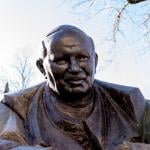THE RELIGION GUY raises the above question and answers it with a few thoughts upon the 500th anniversary of the Protestant Reformation. This vast, ongoing split in Christianity involved theology and spirituality, but as a journalist The Guy [disclosure: a lay Protestant] will emphasize culture. The uproar originated on October 31, 1517 (All Saints’ Eve), when Martin Luther issued his “95 Theses.” Matters evolved from there into a sweeping assault on the papacy and the Catholic Church.
Historians debate whether the tempestuous Wittenberg professor actually posted this protest on the legendary door of the town church or simply distributed it. Whatever, Luther sent a copy to the Germans’ most powerful churchman, Archbishop Albrecht, who fatefully referred it to the Vatican for scrutiny.
The “Theses” decried lavish sales of “indulgences” from the church’s “treasury of merits” to lessen punishments due for sins of the living and of the dead in Purgatory. Rid of corrupt money-raising, indulgences still operate in 2017 (per “Catechism of the Catholic Church” #1471 – 1479).
The indulgence money was supposed to fund construction of St. Peter’s Basilica in Rome. But Albrecht skimmed off half the proceeds to repay a loan of 23,000 ducats he used to purchase leadership of Germany’s most lucrative diocese — at age 23! When Luther faced Catholic derision for violating his monk’s vows and marrying, he told Albrecht to end his unwed sexual partnership!
In other words, late medieval Catholicism had some problems. Nonetheless, was this split necessary? Anniversary commentaries muse that missteps on both sides forced an unfortunate permanent division instead of the internal church reform Luther had hoped for, and note that nowadays few parishioners worry much about the doctrines that were at issue.
If Luther had not appeared, a church explosion was inevitable anyway, judging from the fury with which dissent swept Germanic states and beyond, alongside the emergence of other Reformers such as John Calvin. The pioneer Czech proto-Protestant Jan Hus, betrayed and burned at the stake for heresy in 1415, simply came a century too soon.
Protestantism was a religion uniquely established by technology. Decades earlier, Germany had innovated with printing using movable type that made possible unprecedented proliferation of Protestant tracts that provoked popular rebellion. Many were by Luther, the era’s best-selling author. Protestantism called for universal Bible-reading in popular languages, and Luther’s translation became a monument of German literature.
Luther was an outlaw under threat of execution by the Holy Roman Empire, and he and his movement only survived due to protection from regional princes. Soon after Luther’s death his cause was all but crushed by imperial soldiers, yet somehow persisted. Necessary subservience to secular rulers set a problematic precedent for later Protestants under Hitler’s dictatorship.
Alec Ryrie of Britain’s Durham University uses a bold subtitle for his “Protestants: The Faith That Made the Modern World” (Viking). Ryrie’s history, and myriad new biographies, say Luther himself was medieval, not modern. But gradually, Protestantism fostered mass literacy and education, representative government for both church and society, church-state separation, freedom of conscience, free market economics, and secularism.
Results for churches included individualism, perpetual change and instability, and an infinite variety of church splits. Confusing? Embarrassing? Ryrie insists these are strengths over against centralized, bureaucratic, and tradition-bound Catholic governance, making Protestantism infinitely adaptable to the spiritual needs of specific groups and contexts.
At and after the Second Vatican Council, Catholicism embraced Protestant-style religious freedom, the “priesthood of all believers” symbolized by lay memberrs receiving the cup as well as the bread at Communion, personal Bible study, and worship in common languages instead of Latin. In principle, Catholicism could someday agree with Protestants on married clergy.
Rome and major Protestant blocs embrace a joint accord on salvation by God’s grace through faith, rather than good deeds, which was Luther’s central teaching, taken from biblical Paul and St. Augustine (text at www.cesnur.org/testi/cath_luth_1.htm). But Protestants still insist on “Scripture alone” as the authority for Christian teaching.
Protestantism is on the wane in Europe and struggles in America, including disagreements over same-sex marriage and new-fangled “worship styles.” By contrast, Protestant and similar “independent” churches thrive across the developing world, and Ryrie sees a rosy future.
However, Mark Bauerlein of First Things magazine offers a sobering anniversary thought. He compiles bleak survey research demonstrating that today’s youths, while not illiterate, suffer from “a-literacy.” That means they were taught how to read and write but rarely read anything for pleasure outside school requirements. He wonders, “What becomes of a faith that places a book at the center of worship if the rising generation doesn’t read?” What, indeed?












